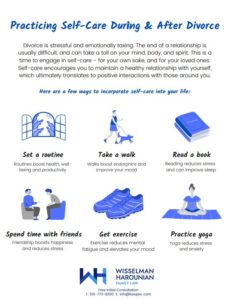DIVORCE IS STRESSFUL
Regardless of circumstance, divorce is tough. Emotionally, it is a draining process. From a practical standpoint, it impacts every facet of your day-to-day life. It is not uncommon for people to wonder how divorce will impact their existing assets, debts, investments and retirement accounts. Adding to the stress of divorce is how it will affect your future reality and potentially influence income, parenting, and future financial well-being. Divorce is an all-encompassing experience that taps clients emotionally, financially, and legally.
To get through divorce, you need a competent family law attorney who is passionate about advocating for your needs. You need the peace of mind that comes with understanding that there is a skilled, specialized professional in your corner who is working tirelessly on your behalf. The price is just too high to settle for anything less.
When you hire our law firm. you are counting on us to get you the best outcome possible. To guide you and support you when you need it. Our support staff is only a phone call or email away if you have questions about your case or need information.
However, you can also lean on friends and family for support. And we encourage you to find ways to take care of yourself — to take on this challenge day by day.
View our coping techniques guide.

CULTIVATING GRATITUDE
We can cultivate gratitude in various ways. Consider incorporating one or more of the following:
Start small – make gratitude a habit, when a negative thought pops into your mind, counter it with a positive one.
Ready to level up? Start a gratitude journal to keep track of what you are grateful for
Reach out to someone you care about via Zoom or in person
Gratitude affirmations
- I invite gratitude into my heart every day.
- I’m grateful for another year to make happy memories.
- I am present and in the moment.
Try a gratitude meditation. Here’s one:
Let go of any grudges, forgive those who may have slighted you to allow room for gratitude
1 Emmons, R. (n.d.). Why gratitude is good. Greater Good. Retrieved November 12, 2021, from https://greatergood.berkeley.edu/article/item/why_gratitude_is_good.
2 Froh, J. J., Sefick, W. J., & Emmons, R. A. (2008). Counting blessings in early adolescents: An experimental study of gratitude and subjective well-being. Journal of School Psychology, 46(2), 213–233. https://doi.org/10.1016/j.jsp.2007.03.005
3 Jackowska, M., Brown, J., Ronaldson, A., & Steptoe, A. (2016). The impact of a brief gratitude intervention on subjective well-being, biology and sleep. Journal of Health Psychology, 21(10), 2207–2217. https://doi.org/10.1177/1359105315572455
4 Digdon, N., & Koble, A. (2011). Effects of constructive worry, imagery distraction, and gratitude interventions on sleep quality: A pilot trial. Applied Psychology: Health and Well-Being, 3(2), 193–206. https://doi.org/10.1111/j.1758-0854.2011.01049.x
Divorce may pose changes to daily and holiday routines, and interfere with work and school obligations.
It is perhaps more important than ever to recognize the people and opportunities that bring us joy during these difficult times. During periods of change and uncertainty, adopting a grateful mindset can help us transform life’s challenges into ones which build resilience. “There is evidence that grateful people are more resilient to stress in general, whether we’re talking about minor everyday hassles or major personal upheavals, or simply the stress of the holidays” ” says Robert A. Emmons, Psychology professor at University of California, Davis and founding editor in chief of the “Journal of Positive Psychology.”1
Research has linked positive emotions like gratitude to health and wellness.2 Consciously focusing on gratitude can help you cope with the logistical and emotional post-divorce hardships. Try turning your attention to what remains after divorce: kids, career, health, etc. Counting blessings has clear medicinal benefits as well. Several studies have examined the relationship between gratitude and physical health markers such as cardiovascular health, pain perception, and sleep.3 Gratitude was found to elicit increased optimism and sleep quality along with decreased diastolic blood pressure.



